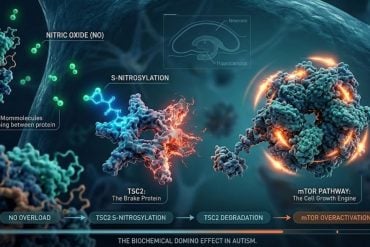Summary: A new study reports mothers who demonstrate better emotional control and problem solving abilities have a more positive influence on their child’s behavior.
Source: Brigham Young University.
A new parenting study finds that the greater emotional control and problem-solving abilities a mother has, the less likely her children will develop behavioral problems, such as throwing tantrums or fighting.
The study also found mothers who stay in control emotionally are less likely to be verbally harsh with their children, and mothers who stay in control cognitively are less likely to have controlling parenting attitudes. Both harsh verbal parenting and controlling parenting attitudes are strongly associated with child conduct problems.
“When you lose control of your life, that impacts how you parent,” said lead author Ali Crandall, assistant professor of public health at Brigham Young University. “That chaos both directly and indirectly influences your child’s behavior.”
For the study, newly published in academic journal Family Relations, Crandall and co-authors at Johns Hopkins University and Virginia Tech collected data from 152 mothers who had children between 3 and 7 years of age. The mothers ranged from 21 to 49 years old; 62 percent were married and nearly one-third had not earned more than a high school diploma.
The mother’s emotional control was measured through a 10-item questionnaire asking how often subjects do things such as “have angry outbursts” or “overreact to small problems.” Executive functioning, or cognitive control, was measured through a series of tasks. Executive functioning is what helps people manage chaos and achieve daily goals, and includes planning, problem solving and directing attention to what is most important.
Once researchers recorded the emotional control and executive functioning levels of the mothers, they then provided a series of questionnaires to identify parenting attitudes, levels of harsh verbal parenting and the amount of conduct problems their children exhibit.
They not only found that mothers who had higher emotional and cognitive control were less likely to report poor child conduct, such as fighting with other children or throwing tantrums when they don’t get what they want, but they also found relationships between a mother’s control abilities and parenting behaviors. For example, mothers with better emotional control were less likely to see their children’s ambiguous behavior in the worst light.
Authors said the findings imply that to effectively reduce harsh verbal parenting and child behavioral problems, interventions should help mothers improve their emotional and cognitive control capacities.

“There are some clear ‘signals’ that our supply of self control is being run down — when we are feeling distracted, irritable, and tired,” said study co-author Kirby Deater-Deckard, professor of psychological and brain sciences at UMass-Amherst. “Parents can practice recognizing these signals in themselves when they are occurring, and respond by taking a ‘time out’ if at all possible — just as we might do with our child when we notice these signals in them.”
And while it is fairly difficult for an adult with a fully-developed brain to improve their executive functioning — previous research has shown that the prefrontal cortex of the brain, where executive functioning is housed, is generally developed over the first two to three decades of life — the authors said even small improvements in a few basic things can make a significant difference for parents.
“Getting enough sleep, exercising enough and eating well are all things that impact our executive functioning,” Crandall said. “We should create healthy environments that help us operate at our best.”
Source: Todd Hollingshead – Brigham Young University
Publisher: Organized by NeuroscienceNews.com.
Image Source: NeuroscienceNews.com image is in the public domain.
Original Research: Abstract for “The Interface of Maternal Cognitions and Executive Function in Parenting and Child Conduct Problems” by Alice Ann Crandall, Sharon R. Ghazarian, Kirby Deater‐Deckard, Martha Ann Bell, and Anne W. Riley in Family Relations. Published May 25 2018.
doi:10.1111/fare.12318
[cbtabs][cbtab title=”MLA”]Brigham Young University “Mothers with High Emotional and Cognitive Control Help Their Children Behave.” NeuroscienceNews. NeuroscienceNews, 31 May 2018.
<https://neurosciencenews.com/mom-emotion-cognition-behavior-9197/>.[/cbtab][cbtab title=”APA”]Brigham Young University (2018, May 31). Mothers with High Emotional and Cognitive Control Help Their Children Behave. NeuroscienceNews. Retrieved May 31, 2018 from https://neurosciencenews.com/mom-emotion-cognition-behavior-9197/[/cbtab][cbtab title=”Chicago”]Brigham Young University “Mothers with High Emotional and Cognitive Control Help Their Children Behave.” https://neurosciencenews.com/mom-emotion-cognition-behavior-9197/ (accessed May 31, 2018).[/cbtab][/cbtabs]
Abstract
The Interface of Maternal Cognitions and Executive Function in Parenting and Child Conduct Problems
Objective
To explore the direct and indirect associations of maternal emotion control, executive functioning, and social cognitions with harsh verbal parenting and child behavior and to do so guided by social information processing theory.
Background
Studies have demonstrated a relationship between maternal harsh parenting and increased child conduct problems. However, less is known about how maternal emotion and cognitive control capacities and social cognitions intersect with harsh parenting and child behavior.
Method
Structural equation modeling was used with a convenience sample of 152 mothers from Appalachia who had a child between 3 and 7 years of age.
Results
Maternal emotion control and executive functioning were both inversely associated with child conduct problems. That is, stronger maternal emotion control was associated with less harsh verbal parenting and lower hostile attribution bias, and higher maternal executive functioning was related to less controlling parenting attitudes.
Conclusion
The results suggest maternal emotion and cognitive control capacities affect how mothers interact with their children and ultimately child conduct problems.
Implications
To more effectively reduce harsh verbal parenting and child conduct problems, interventions should help mothers to improve their emotion and cognitive control capacities.







